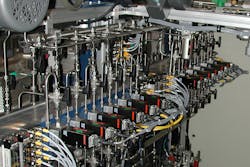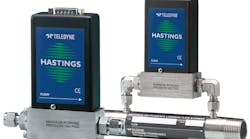As their name suggests, mass flow controllers (MFCs) measure and control mass flow. Their control valve can open and close to allow or stop flow. With its bypass design, some of the fluid is diverted to pass through a small capillary tube. The diverted flow is measured, usually with thermal principles, and used to compute the total mass flow. By contrast, a mass flow meter has a bypass for measurement purposes and does not have a control valve, so it can measure the flow but not control it.
The semiconductor market accounts for the majority of MFCs shipped worldwide. The market’s cycles last between 12 and 18 months and typically experience more economic ups and downs than typical process industry markets. It has, however, recovered since the economic downturn in 2009 and 2010.
The Use of MFCs Is Expanding in Industrial Markets
Some industrial markets, such as automotive and aerospace, are now weak because of high energy costs. Others, such as emissions monitoring and biotech/pharmaceutical, are thriving with environmental regulations and upgrades in manufacturing processes, and a need for alternative energy sources will drive additional research and development in the foreseeable future. MFCs will benefit from these industrial segments because they are used to measure and control gas flows in these segments. Fuel cells represent another area of growth for MFCs.
MFCs Are Replacing Manual Systems
The trend today is toward the automation provided by MFCs and away from the lower accuracy of variable area flow meters, which also measure and control gas flow. While some variable area meters have been developed with an output signal, the majority need to be read manually, and the needle valve is adjusted manually.
Economic growth in China, India and other emerging markets should continue with an increase in population and demand growth in industrial segments including energy consumption, food and beverage, automotive, and power. Demand for computers and semiconductor products will also grow in China and India, causing an increasing use of MFCs during the next several years.
Mergers & Acquisitions in the MFC Market
Mergers and acquisitions in the past eight years have been frequent in the MFC market. Brooks Instrument acquired Celerity in 2009, and Hitachi Metals acquired the Japanese MFC line AERA from Advanced Energy in 2010. While both acquisitions may be positive for the market in the long run, the first impact is sales when product lines are consolidated and other redundant business factors are eliminated. Brooks was sold by American Industrial Partners to Illinois Tool Works in January 2012. Before that, Brooks was sold by Emerson Electric to American Industrial Partners in December 2007.
For more information about Flow Research’s work on MFCs, visit www.flowmfc.com. Jesse Yoder, Ph.D., is president of Flow Research Inc. in Wakefield, Massachusetts, a company he founded in 1998. He has 28 years of experience as an analyst and writer in instrumentation. He holds a U.S. patent on a dual-tube meter design and is the author of The Tao of Measurement, published by ISA. Dr. Yoder also founded the Flowmeter Recalibration Working Group, addressing the topic of recalibration frequency. He may be reached at [email protected].


